 MyDogBreeds
MyDogBreeds Basque Shepherd is originated from Spain but Azawakh is originated from Mali. Basque Shepherd may grow 14 cm / 5 inches shorter than Azawakh. Both Basque Shepherd and Azawakh are having almost same weight. Both Basque Shepherd and Azawakh has same life span. Both Basque Shepherd and Azawakh has almost same litter size. Both Basque Shepherd and Azawakh requires Moderate maintenance.
Basque Shepherd is originated from Spain but Azawakh is originated from Mali. Basque Shepherd may grow 14 cm / 5 inches shorter than Azawakh. Both Basque Shepherd and Azawakh are having almost same weight. Both Basque Shepherd and Azawakh has same life span. Both Basque Shepherd and Azawakh has almost same litter size. Both Basque Shepherd and Azawakh requires Moderate maintenance.
 The Basque Shepherd is one of the oldest dog breeds. With this Spanish dog, you’ll find paintings dating back 12,000 years ago. The Basque Shepherd is known as a landrace breed, which means the dog hasn’t gone through the same selective breeding programs as what other breeds have. Landrace breeds have more variations in appearance and temperament than regular breeds.
The Basque Shepherd is one of the oldest dog breeds. With this Spanish dog, you’ll find paintings dating back 12,000 years ago. The Basque Shepherd is known as a landrace breed, which means the dog hasn’t gone through the same selective breeding programs as what other breeds have. Landrace breeds have more variations in appearance and temperament than regular breeds.
The Basque Shepherd has 2 distinct varieties, the Gorbeiakoa and the Iletsua. The smooth-haired Gorbeiakoa has a softer coat that is fairly short while the rougher-haired Iletsua has a lighter coloured coat, and unlike the Gorbeiakoa, the ears are not typically erect.
Even though this is an ancient breed of dog, only the Royal Canine Society of Spain recognizes the breed with the two varieties, and in January 1996, the two breeds - Iletsua and Gorbeikoa – were recognized.
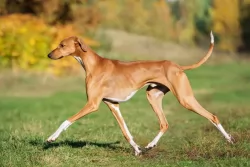 Azawakh dog was bred by the nomads in Africa. They were originally bred to be a guard dog. But, they realized that their body shape and bone structure allows them to run really fast (some say that they can run at the speed more than 65 km/h. This fact made them ideal for the hunting. Nowadays, they can be found across the globe but they are still very rare kind of a dog because they can survive and adapt to very high temperatures but they are very intolerant of low temperatures. Male Azawakh is slightly bigger than a female dog, with a greater instinct for guarding, hunting and taking care of the family and the pact.
Azawakh dog was bred by the nomads in Africa. They were originally bred to be a guard dog. But, they realized that their body shape and bone structure allows them to run really fast (some say that they can run at the speed more than 65 km/h. This fact made them ideal for the hunting. Nowadays, they can be found across the globe but they are still very rare kind of a dog because they can survive and adapt to very high temperatures but they are very intolerant of low temperatures. Male Azawakh is slightly bigger than a female dog, with a greater instinct for guarding, hunting and taking care of the family and the pact.
 The Basque Shepherd is a strong, well proportioned dog with brown eyes and medium sized ears, which sometimes have folds. This medium-to-large dog has a beautiful fawn coat of medium-length hair that can be straight or slightly wavy. He has a long feathery tail that will wag readily when he sees his owner. You’ll find other colors for the Basque Shepherd shared between the two varieties - a yellow orange or copper coat with other shades being red, blue and black. His hair is shorter on the head and he doesn’t battle with hair over the eyes.
The Basque Shepherd is a strong, well proportioned dog with brown eyes and medium sized ears, which sometimes have folds. This medium-to-large dog has a beautiful fawn coat of medium-length hair that can be straight or slightly wavy. He has a long feathery tail that will wag readily when he sees his owner. You’ll find other colors for the Basque Shepherd shared between the two varieties - a yellow orange or copper coat with other shades being red, blue and black. His hair is shorter on the head and he doesn’t battle with hair over the eyes.
The Basque Shepherd is a highly intelligent dog and also very energetic. Of the two different kinds of Basque Shepherd, it is the Gorbeiakoa which is the more outgoing. The dogs will require a firm owner and they thrive on the discipline when it is combined with lots of with lots of exercise and activities.
The Basque Shepherd is generally friendly with people, if not a little reserved with strangers. He gets on well with children and other pets in the home, although socialization and training will be necessary to bring out their best.
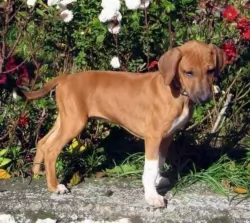 Azawakh is a large dog breed placed in a family of the hounds. It looks almost like any hound we know – slim, with long and skinny legs, with a big-boned chest with a stomach placed up with the spine. They have thin and a bit longer tail, narrow nose and small skull in a triangle shape. Their body may look skinny but it is just the way they should look. Actually, you could probably see the bone structure of the adult Azawakh because they, like any other hounds, have specific muscles – very thin and flat. They can be found in many coat colours like sand, fawn or dark fawn, even brown. Their coat is very short, usually with white marks on the neck, chest and all four paws. In Africa, Azawakh can be found in a diversity of colours.
Azawakh is a large dog breed placed in a family of the hounds. It looks almost like any hound we know – slim, with long and skinny legs, with a big-boned chest with a stomach placed up with the spine. They have thin and a bit longer tail, narrow nose and small skull in a triangle shape. Their body may look skinny but it is just the way they should look. Actually, you could probably see the bone structure of the adult Azawakh because they, like any other hounds, have specific muscles – very thin and flat. They can be found in many coat colours like sand, fawn or dark fawn, even brown. Their coat is very short, usually with white marks on the neck, chest and all four paws. In Africa, Azawakh can be found in a diversity of colours.
 The dog is well suited to being a family pet, loving to spend time with family, being a people-oriented breed. He gets on well with children as well as other pets in the home, but can be reserved with strangers.
The dog is well suited to being a family pet, loving to spend time with family, being a people-oriented breed. He gets on well with children as well as other pets in the home, but can be reserved with strangers.
He doesn’t have an aggressive nature, and yet he does what it takes to protect his beloved human family.
He is full of energy, hardy and tough. He loves his human family and wants to be included in all their activities. He is energetic though and as a responsible dog owner, you want to make sure that your Basque Shepherd has enough space to run.
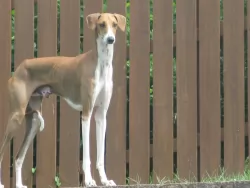 Once Azawakh is a part of the family, he will try to find his place. If you teach him that you are the main figure, they will be obedient and affectionate pet. They love children, and they will surely be always close to them, guarding them and making sure they are safe.
Once Azawakh is a part of the family, he will try to find his place. If you teach him that you are the main figure, they will be obedient and affectionate pet. They love children, and they will surely be always close to them, guarding them and making sure they are safe.
canine freestyle sports, heelwork to music competitions.
If your Azawakh pet is trained well and socialized, they can fit in almost anywhere. Some will say that they hate cats, but there are some cases where they were raised with them and they did just fine. They will be quite tolerant of a stranger in your house. Since they get attached to the family, it is not recommendable to consider this breed as a new-owner kind of pet.
Once you set yourself as a pact leader, you will have almost no problems with training your dog various tricks. Azawakh is an intelligent breed, they learn quickly and they will be more than happy to show you every day what they have learned. It is necessary to start socializing your Azawakh dog while he is still a pup. They don’t respond well to harsh methods of teaching so you should really avoid them.
 Because this is an ancient breed, the Basque Shepherd doesn’t have to contend with genetic health problems such as more modern breeds. Just like other dogs though, he could be prone to certain conditions such as hip dysplasia, eye problems, ear infections and cancer. As a larger breed, he may also be prone to bloat.
Because this is an ancient breed, the Basque Shepherd doesn’t have to contend with genetic health problems such as more modern breeds. Just like other dogs though, he could be prone to certain conditions such as hip dysplasia, eye problems, ear infections and cancer. As a larger breed, he may also be prone to bloat.
Breeds with floppy ears, such as the Basque Shepherd will be more prone to developing ear infections. To prevent infection, keep his ears clean and dry. If you’re unsure, the vet can guide you how- and what to do.
This is a disease which is common to other dog breeds too and not just the Basque Shepherd. This condition affects the hip joints and can result in chronic pain for the dog and also lameness. Checking your dog’s weight is important and the pain can be managed with medication.
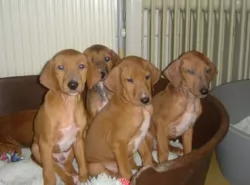 The Azawakh breed is very rare and this kind of information cannot be still guaranteed. If they are bred with a healthy family, they are usually very healthy and don’t need much of the vet care. Some of the diseases that were found in a medical history of this magnificent dog report heart problems (usually caused by their super high need of daily activity), problems with the thyroid glands, and skin diseases caused by the increased secretion of the thyroid glands which causes their skin to become dry and in some cases even the loss of the hair.
The Azawakh breed is very rare and this kind of information cannot be still guaranteed. If they are bred with a healthy family, they are usually very healthy and don’t need much of the vet care. Some of the diseases that were found in a medical history of this magnificent dog report heart problems (usually caused by their super high need of daily activity), problems with the thyroid glands, and skin diseases caused by the increased secretion of the thyroid glands which causes their skin to become dry and in some cases even the loss of the hair.
 This is a medium to large breed dog and he should therefore be fed a high quality food which has been formulated for medium to large breeds. Because he is a herding dog, you might want to also look at an active-dog or working-breed formula to supply him with that much needed energy.
This is a medium to large breed dog and he should therefore be fed a high quality food which has been formulated for medium to large breeds. Because he is a herding dog, you might want to also look at an active-dog or working-breed formula to supply him with that much needed energy.
The Basque Shepherd’s coat is lush and long with either straight or wavy hair. Regular brush at least twice a week will maintain the coat, get rid of loose hair and prevent fleas.
The Basque Shepherd is an intelligent breed that will respond well to socialization and training. He is a breed that loves sports too because of this very high energy levels. You need to be careful with the Basquae Shepherd around small children, not because he is aggressive in any way, but because he is highly active, and his exuberance and boisterous antics could see him unintentionally knocking over small children.
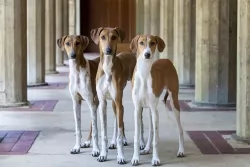 The Azawakh bred has a high risk of the obesity. They must be fed with special care since the food they eat can affect the thyroid glands function. They should never be overfed by average dry dog food. You will be advised to give them food with little percentage of the protein. They drink a lot of water and they like the dairy products. Their meals shouldn’t include fruits and vegetables, and some grains (millet, rice). They do not need to eat a lot of meat, but you can add some chicken in their meals.
The Azawakh bred has a high risk of the obesity. They must be fed with special care since the food they eat can affect the thyroid glands function. They should never be overfed by average dry dog food. You will be advised to give them food with little percentage of the protein. They drink a lot of water and they like the dairy products. Their meals shouldn’t include fruits and vegetables, and some grains (millet, rice). They do not need to eat a lot of meat, but you can add some chicken in their meals.
Puppies should be fed three times per day. Their portions should be small and diverse. Keep in mind to feed them at the same time each day because their metabolism will be formed by this. Adult dogs are fed two times per day, at the same time as well. After the meal, let them rest for an hour or two and never give them meals right after high physical activity.
If you want your Azawakh dog to be healthy and happy make sure you provide them with enough space to run, explore, dig holes and always have some fresh water. They don’t need regular vet checks, but if you notice some changes in their digestion, lower activity or skin abnormalities, it is very important to take them to the vet station. They should never be kept indoors, so if you are living this kind of life maybe this kind of dog is not for you. But, if you are super active and if you have a couple of hours per day to spend with your Azawakh, maybe you can make him feel a lot better.
Since they like the warmer climate, you can take them running with you. They will be a great companion while you bike and leave them leash free but only if he is trained to stay by your side. If you have a yard, make sure to leave some areas free for digging and hiding their special toys or treats. They are extremely playful and cheerful, so they will wander off in no time. Some of the Azawakh dogs were great on the hiking trips, so you can try this daily activity once you train him to listen to you.